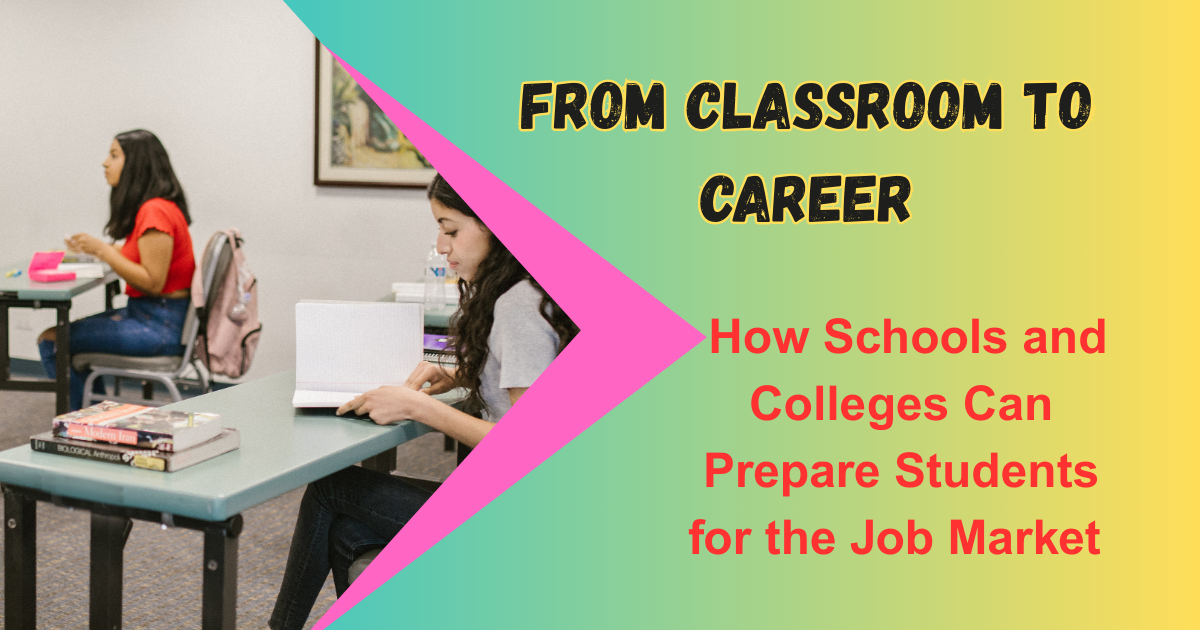From Classroom to Career: How Schools and Colleges Can Prepare Students for the Job Market: The rapid advancements in technology and globalisation have transformed the world into a highly competitive arena. Today’s generation is constantly racing against time, striving to stay ahead in an environment where the only constant is change.
From Classroom to Career
The transition from classroom to career is an important phase in every student’s journey. It is where knowledge meets real-world applications, and skills are shaped for future success. In today’s competitive world, having a degree is not enough. Employers seek graduates with hands-on experience. It is important to have thinking abilities and leadership skills.

The journey of the student is smoother from classroom to career. When students are guided by experienced faculty supported by state-of-the-art resources and given opportunities to explore their potential. A bright future for a student starts with a foundation, and choosing the right university plays a vital role.
Career education is no longer a mere supplement to traditional schooling but a necessity. It involves guiding students to understand various career paths, equipping them with the skills required for their chosen fields.
The modern workforce demands more than just academic excellence; it requires critical thinking, problem-solving abilities, intelligence, and a knack for innovation.
How Schools and Colleges Can Prepare Students for the Job Market
The role of higher education in preparing the students for the job market has increasingly come under scrutiny. Workforces are transforming; technological advancements are reshaping industries, creating new roles while rendering others obsolete.
The shift in higher education acknowledges the necessity of adapting to the demands of a global economy where competitive edge is increasingly defined by innovation and technical capabilities. Higher education equips students with the knowledge to stay ahead of the curve, with many jobs that once required only a high school diploma now demanding college-level expertise.
There are some ways that can help them be better prepared and equipped for the jobs of the future:
1. Students Should Lead their learning
Empathy – looking at things from the other’s perspective – can sometimes be a one-way road in the classroom. Such an attitude negatively impacts the student’s growth as a person and future team member within a company or organisation.
2. Make the student Curious
Crediting situations that encourage students’ curiosity is an important function of the brain. While curiosity can’t be fostered as a trait, you can bring it out in any of the students based on particular contexts. As such, certain parts of the curious brain may arouse.
3. Encourage Collaboration
Every person is unique in their own way; therefore, every student has different things to say, sees things in a particular and individual way based on their brain anatomy and experience, and has a different learning style of the student.
4. Create an Environment.
In an ever-changing world and workplace environment, being able to memorise facts and procedures is not enough for the students’ success anymore. Sometimes, situations arise when other aspects of an employer’s skills are needed. Additionally, removing certain constraints is one of the things that can help create the desired climate upon which creativity can thrive.
5. Help the students Develop their critical thinking skill
A simple definition of important thought is “the ability to analyse information”. From this, we can gather that being able to think objectively about specific problems and situations and come up with logical yet well-researched solutions is very important to employers.
- Identifying the problem of the student
- Thorough researching
- Using an objective eye
- Analyzing the situation from all angles of the problem
- Making an informed decision
6. Get Comfortable with the Idea of changes
Everything is in constant motion, including the world itself. That is why refusing to change can stop someone on their track to getting that ever-desired job. Another reason why people might not like change so much is that the unknown is uncomfortable.
Conclusion
In this article we discussed From Classroom to Career: How Schools and Colleges Can Prepare Students for the Job Market. The transition from classroom to career is an important phase in every student’s journey. Career education is no longer a mere supplement to traditional schooling but a necessity. It involves guiding students to understand the matter of the student.
